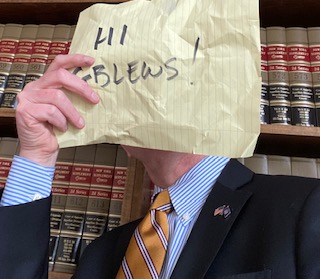I’m citing to NYS law here, because that’s what I’m familiar with but these are general principles:
Police do not determine if a crime was committed. Rather, they form a basis as to whether, given the facts and circumstances known to them, there is a “reasonable belief” that a crime was committed (see, e.g., People v Stroman, 106 AD3d 1268 [2013]).]).
This sounds like it was written by a defense lawyer, or politicians who used to be defense lawyers. I guess the statement that police determine if a crime has been committed is too simple for them,
You got way too hung up on that first sentence, bruh. Anyway, this does not rebutt my statement at all. It simply says that the police determinr after their investigation, if they have a“reasonable belief” a crime was committed. If they determine that they don’t have a “retainable belief” crime was committed, they don’t look for suspects and make no arrests. If police conclude a crime was committed, they identify suspects, make attests, and if they believe they have the guilty parties, file charges.
But make no mistake, , it is within the powers of police to determine if a crime was committed.
Please point out the language in your post that directly rebuts what I just wrote.
Assuming the case proceeds to trial (and putting aside the concept of “jury nullifcation”), the jury must find that all elements of the crime were proven beyond a reasonable doubt, i.e., that a crime occurred, and the defendant’s commission thereof (see, e.g., CPL § 70.20; People v. Roldos, 112 A.D.2d 388 [1985]). This means the jury has to decide (beyond a reasonable doubt) first that a crime was committed (e.g., the elements are there) and THEN that the defendant is the one who did
Did you put the word “then” in caps, or was that part of the text you copied?
You completely misunderstood this passage. It simply is giving the procedure the jury is to follow in order to determine guilt or innocence of the defendant. If the jury acquits because they believe no crime was committed, that does not affect at all the police determination that a crime was committed. It would just be one basis for an acquittal. But officially, the recording of a crime would remain on record. It would then likely be classified as an unsolved crime,.
Think about it, when the jury verdict is read, the only thing heard from them is “guilty” or “innocent.” The jury is not asked whether or not a crime was committed. That is probably because the reasons for the verdict are I largely irrelevant.
(Note: I acknowledge under the above that a jury could find a defendant not guilty because, even though the jury finds a crime was a committed they do find sufficient evidence that the defendant was the party who committed it. However, the jury still have to find the crime was even committed to get to that point).
Do you get the difference though, between the juries’ opinion on whether or not a crime wa committed and the official determination that a crime was committed? The juries beliefs are merely their opinions which may or may not affect their verdict. If the police (and prosecutor) do not believe a crime was committed, them there is nno need for a jury because, no trial.
Beyond that, as I said before, the evidence gathering phase often begins before the police have established reasonable cause to believe a crime was committed and, depending on the nature of the suspected offense, statements made by persons of interest or suspects are what provides that reasonable cause. With this in mind, even if Baldwin (or anyone else) had a good faith belief that he or she was innocent of any crime, it was highly advisable to have an attorney present.
Let me reiterate, to my knowledge, there is still no criminal investigation going on. Therefore, there are no suspects or persons of interest. The police very well may suspect a crime occurred, but to date, they have not made it clear that they even suspect a crime was committed. That may change at some point, but we’re not there yet, unless you have information to the contrary. If so, post it.
Also, as I said before, Baldwin is not “innocent,” ne has not been charged or identified as a suspect ot person of interest. And I’m sure he feels he I’d behaving accordingly.[/QUOTE]

 Oh, and for the record I didn’t say that the professions of the authors of the cited you quoted mar reread. It was just an observation. You misunderstood that as well.
Oh, and for the record I didn’t say that the professions of the authors of the cited you quoted mar reread. It was just an observation. You misunderstood that as well.  Stop, You found this stuff online and copied and pasted it in.. Nothing wrong with that, so why the subterfuge? Anyway, as I said, I think you misunderstood most of what you copied anyway, “law library” or not.
Stop, You found this stuff online and copied and pasted it in.. Nothing wrong with that, so why the subterfuge? Anyway, as I said, I think you misunderstood most of what you copied anyway, “law library” or not.
